
 Here is why I love Dune: It doesn’t work. Not as a drama. Not as a space opera. Not as a war movie. By the basic tenets of comprehensible storytelling, it’s ridiculous. Its overall failure is legendary. But taken as a whole, it’s a twisted dream, rife with spectacularly unique imagery and a baroque, Flash Gordon-like design that never fails to draw me in, even while I’m picking it apart.
Here is why I love Dune: It doesn’t work. Not as a drama. Not as a space opera. Not as a war movie. By the basic tenets of comprehensible storytelling, it’s ridiculous. Its overall failure is legendary. But taken as a whole, it’s a twisted dream, rife with spectacularly unique imagery and a baroque, Flash Gordon-like design that never fails to draw me in, even while I’m picking it apart.
But this is what happens when you hire David Lynch, that most idiosyncratic and nonlinear of directors, to adapt Frank Herbert’s dense, sci-fi classic. Lynch pares the plot of a space messiah on a desert planet past the bare essentials to a series of stunning images, tying them together with the most convoluted of narratives, goofy dialogue and aggressively uneven special effects — the first appearance of a sand worm is a classic, but the poor use of green screen would make modern Asylum mockbusters blush with shame.
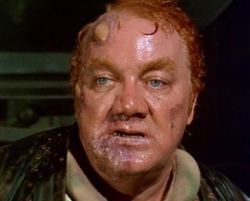 Yet within Dune lie the seeds of something much greater. Watch as the Guild Space Navigator (an effects wonder) speaks through a grotesque vaginal slit. Gaze upon Baron Harkonnen (Kenneth McMillan), his face swollen with boils, hovering beneath a shower of oil. Listen to the absurd rock score by Toto, which under no circumstance should work, yet does so gloriously. View the premature birth of a mutated reverend mother from the inside of the womb.
Yet within Dune lie the seeds of something much greater. Watch as the Guild Space Navigator (an effects wonder) speaks through a grotesque vaginal slit. Gaze upon Baron Harkonnen (Kenneth McMillan), his face swollen with boils, hovering beneath a shower of oil. Listen to the absurd rock score by Toto, which under no circumstance should work, yet does so gloriously. View the premature birth of a mutated reverend mother from the inside of the womb.
Dune, again, is ridiculous, with a game cast vastly more talented than necessary. However, by watching it, you glimpse the nightmarish vision of a director who just needed a chance to express himself outside the narrative demands of others. If nothing else, it makes you wonder what Lynch (who was approached) would have made of Return of the Jedi. I bet the Ewoks would have been far more feral, festooned with gaping wounds. —Corey Redekop


 I don’t know whether
I don’t know whether 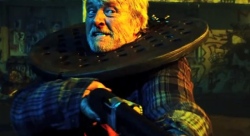 But you also get a surprising amount of flair. Director Jason Eisener is a real talent, using a grittily gorgeous color palette that recalls giallo at its most vivid, and if his script is intentionally silly, it also has a sly wit (at one point, a newspaper headline reads, “Hobo Stops Begging, Demands Change”). While the movie is constantly cranked to 11, Eisener takes everything to another level altogether with The Plague, a pair of armor-clad hit men who may or may not have killed Jesus Christ (if a freeze-frame of their lair is any indication).
But you also get a surprising amount of flair. Director Jason Eisener is a real talent, using a grittily gorgeous color palette that recalls giallo at its most vivid, and if his script is intentionally silly, it also has a sly wit (at one point, a newspaper headline reads, “Hobo Stops Begging, Demands Change”). While the movie is constantly cranked to 11, Eisener takes everything to another level altogether with The Plague, a pair of armor-clad hit men who may or may not have killed Jesus Christ (if a freeze-frame of their lair is any indication).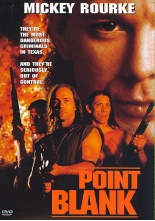
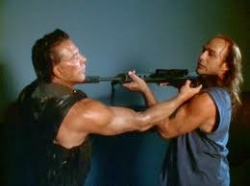 In a performance that defines the phrase “go fuck yourself,” Rourke is Rudy Ray (either the worst or greatest name in action-movie history), a former mercenary called into action when a group of escaped convicts, including his brother, takes over a shopping mall. Mickey mumbles and grunts inarticulately, then goes in, his skin glistening with what I presume to be … oil? God, I hope it’s oil.
In a performance that defines the phrase “go fuck yourself,” Rourke is Rudy Ray (either the worst or greatest name in action-movie history), a former mercenary called into action when a group of escaped convicts, including his brother, takes over a shopping mall. Mickey mumbles and grunts inarticulately, then goes in, his skin glistening with what I presume to be … oil? God, I hope it’s oil. 
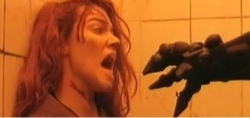 Not much for story, but director Richard Stanley keeps things moving through integrity of vision and an absolutely gorgeous giallo color scheme, layering it with a subtext of man’s symbiotic relationship with machines, first glimpsed through Moses’ artificial hand. Invaluable character actor William Hootkins gets to portray one of filmdom’s most depraved perverts, and Simon Boswell’s throbbing, Western-tinged score will earworm its way into your skull.
Not much for story, but director Richard Stanley keeps things moving through integrity of vision and an absolutely gorgeous giallo color scheme, layering it with a subtext of man’s symbiotic relationship with machines, first glimpsed through Moses’ artificial hand. Invaluable character actor William Hootkins gets to portray one of filmdom’s most depraved perverts, and Simon Boswell’s throbbing, Western-tinged score will earworm its way into your skull.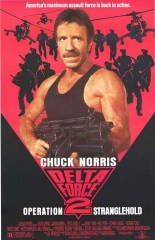
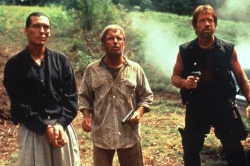 Directed by Aaron Norris (favorite bro of Bristle McSoloflex, and as fine a director as his sib is an actor), Delta Force 2 finds Punch Rockgroin leading some kind of anti-terrorist group, a leader so magnetic that no backstory or character development is necessary. After a friend is killed by Drago, The Beard with No Name works out his rage by kicking the snot out of his men in a training exercise and then traveling to South America for revenge, backed by the U.S. government.
Directed by Aaron Norris (favorite bro of Bristle McSoloflex, and as fine a director as his sib is an actor), Delta Force 2 finds Punch Rockgroin leading some kind of anti-terrorist group, a leader so magnetic that no backstory or character development is necessary. After a friend is killed by Drago, The Beard with No Name works out his rage by kicking the snot out of his men in a training exercise and then traveling to South America for revenge, backed by the U.S. government.